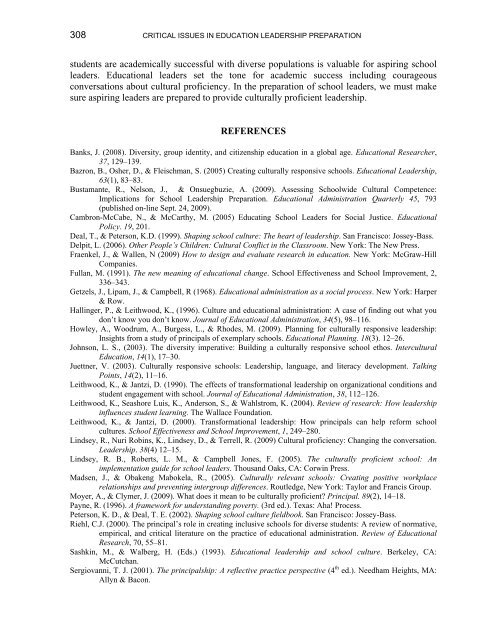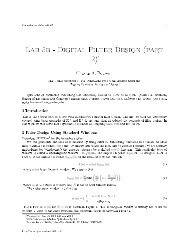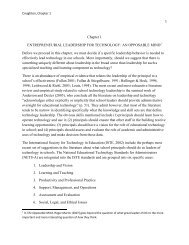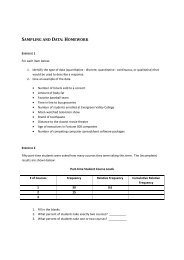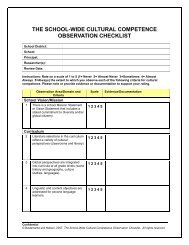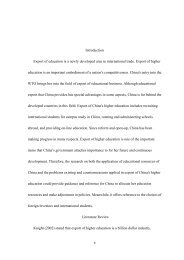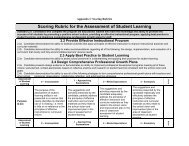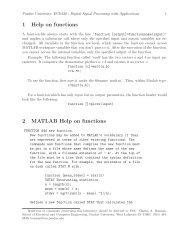Blazing New Trails - Connexions
Blazing New Trails - Connexions
Blazing New Trails - Connexions
You also want an ePaper? Increase the reach of your titles
YUMPU automatically turns print PDFs into web optimized ePapers that Google loves.
308 CRITICAL ISSUES IN EDUCATION LEADERSHIP PREPARATION<br />
students are academically successful with diverse populations is valuable for aspiring school<br />
leaders. Educational leaders set the tone for academic success including courageous<br />
conversations about cultural proficiency. In the preparation of school leaders, we must make<br />
sure aspiring leaders are prepared to provide culturally proficient leadership.<br />
REFERENCES<br />
Banks, J. (2008). Diversity, group identity, and citizenship education in a global age. Educational Researcher,<br />
37, 129–139.<br />
Bazron, B., Osher, D., & Fleischman, S. (2005) Creating culturally responsive schools. Educational Leadership,<br />
63(1), 83–83.<br />
Bustamante, R., Nelson, J., & Onsuegbuzie, A. (2009). Assessing Schoolwide Cultural Competence:<br />
Implications for School Leadership Preparation. Educational Administration Quarterly 45, 793<br />
(published on-line Sept. 24, 2009).<br />
Cambron-McCabe, N., & McCarthy, M. (2005) Educating School Leaders for Social Justice. Educational<br />
Policy. 19, 201.<br />
Deal, T., & Peterson, K.D. (1999). Shaping school culture: The heart of leadership. San Francisco: Jossey-Bass.<br />
Delpit, L. (2006). Other People’s Children: Cultural Conflict in the Classroom. <strong>New</strong> York: The <strong>New</strong> Press.<br />
Fraenkel, J., & Wallen, N (2009) How to design and evaluate research in education. <strong>New</strong> York: McGraw-Hill<br />
Companies.<br />
Fullan, M. (1991). The new meaning of educational change. School Effectiveness and School Improvement, 2,<br />
336–343.<br />
Getzels, J., Lipam, J., & Campbell, R (1968). Educational administration as a social process. <strong>New</strong> York: Harper<br />
& Row.<br />
Hallinger, P., & Leithwood, K., (1996). Culture and educational administration: A case of finding out what you<br />
don’t know you don’t know. Journal of Educational Administration, 34(5), 98–116.<br />
Howley, A., Woodrum, A., Burgess, L., & Rhodes, M. (2009). Planning for culturally responsive leadership:<br />
Insights from a study of principals of exemplary schools. Educational Planning. 18(3). 12–26.<br />
Johnson, L. S., (2003). The diversity imperative: Building a culturally responsive school ethos. Intercultural<br />
Education, 14(1), 17–30.<br />
Juettner, V. (2003). Culturally responsive schools: Leadership, language, and literacy development. Talking<br />
Points, 14(2), 11–16.<br />
Leithwood, K., & Jantzi, D. (1990). The effects of transformational leadership on organizational conditions and<br />
student engagement with school. Journal of Educational Administration, 38, 112–126.<br />
Leithwood, K., Seashore Luis, K., Anderson, S., & Wahlstrom, K. (2004). Review of research: How leadership<br />
influences student learning. The Wallace Foundation.<br />
Leithwood, K., & Jantzi, D. (2000). Transformational leadership: How principals can help reform school<br />
cultures. School Effectiveness and School Improvement, 1, 249–280.<br />
Lindsey, R., Nuri Robins, K., Lindsey, D., & Terrell, R. (2009) Cultural proficiency: Changing the conversation.<br />
Leadership. 38(4) 12–15.<br />
Lindsey, R. B., Roberts, L. M., & Campbell Jones, F. (2005). The culturally proficient school: An<br />
implementation guide for school leaders. Thousand Oaks, CA: Corwin Press.<br />
Madsen, J., & Obakeng Mabokela, R., (2005). Culturally relevant schools: Creating positive workplace<br />
relationships and preventing intergroup differences. Routledge, <strong>New</strong> York: Taylor and Francis Group.<br />
Moyer, A., & Clymer, J. (2009). What does it mean to be culturally proficient? Principal. 89(2), 14–18.<br />
Payne, R. (1996). A framework for understanding poverty. (3rd ed.). Texas: Aha! Process.<br />
Peterson, K. D., & Deal, T. E. (2002). Shaping school culture fieldbook. San Francisco: Jossey-Bass.<br />
Riehl, C.J. (2000). The principal’s role in creating inclusive schools for diverse students: A review of normative,<br />
empirical, and critical literature on the practice of educational administration. Review of Educational<br />
Research, 70, 55–81.<br />
Sashkin, M., & Walberg, H. (Eds.) (1993). Educational leadership and school culture. Berkeley, CA:<br />
McCutchan.<br />
Sergiovanni, T. J. (2001). The principalship: A reflective practice perspective (4 th ed.). Needham Heights, MA:<br />
Allyn & Bacon.


